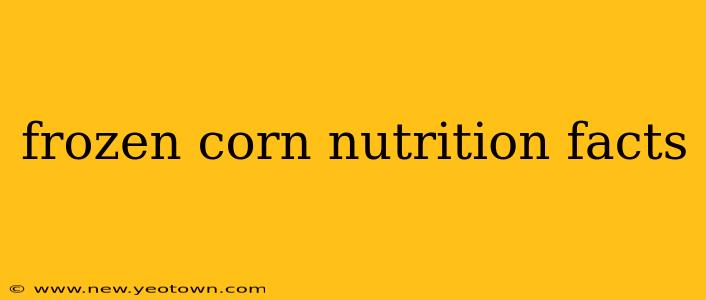Frozen corn, a pantry staple for many, offers a convenient and surprisingly nutritious way to enjoy this summer favorite year-round. But beyond its ease of use, what exactly are the nutritional benefits of frozen corn? Let's take a closer look at the facts, busting some common myths and exploring its place in a healthy diet.
My journey into the world of frozen corn began with a simple question: is it really as good for you as fresh corn? Initially, I was skeptical. After all, isn't freezing going to diminish its nutritional value? The answer, as I discovered, is more nuanced than a simple yes or no.
What are the nutritional benefits of frozen corn?
Frozen corn, when compared to its fresh counterpart, actually holds its own remarkably well. In fact, in many cases, it even surpasses fresh corn in terms of certain nutrients. The quick freezing process, done soon after harvest, locks in many of the vitamins and minerals. This means you get a good dose of fiber, vitamin C, folate, and other essential nutrients even months after harvest. Compared to canned corn, which often has added sugar and salt, frozen corn is a clear winner in terms of preserving the inherent nutritional value.
Is frozen corn as nutritious as fresh corn?
This is a common question, and the answer is a little complicated. While freshly picked corn will always be slightly higher in certain nutrients due to its freshness, the difference is often minimal. Freezing, done properly, helps retain a significant portion of the nutrients. Consider this: fresh corn loses nutrients rapidly after being picked, especially if it sits on the shelf for a few days. Frozen corn, on the other hand, is frozen at its peak nutritional value, essentially preserving those nutrients for later consumption. So, while there's a slight edge for fresh corn, the nutritional benefits of frozen corn are remarkably close.
How many calories are in frozen corn?
A typical half-cup serving of frozen corn contains approximately 70-80 calories. This makes it a relatively low-calorie food option, perfect for those watching their weight or looking for healthier alternatives. This calorie count is comparable to fresh corn, highlighting again the nutritional similarities between the two.
Does frozen corn have high carbs?
Yes, frozen corn, like most corn, is relatively high in carbohydrates. This is primarily due to its starch content. However, this doesn't necessarily make it unhealthy. The carbohydrates are complex carbs, offering sustained energy rather than a quick sugar rush.
Is frozen corn good for weight loss?
Because of its low calorie count and fiber content, frozen corn can be incorporated into a balanced diet for weight loss. The fiber aids in digestion and promotes feelings of fullness, helping to prevent overeating. Remember, weight loss is about a whole dietary approach, not just one specific ingredient.
What are the health benefits of eating frozen corn?
Beyond the vitamins and minerals, frozen corn offers several health benefits. The fiber content promotes healthy digestion, the antioxidants help combat free radicals, and the relatively low calorie count contributes to overall health management.
Is frozen corn healthy?
Absolutely! Frozen corn is a healthy and convenient way to add a serving of vegetables to your diet. It’s a versatile ingredient, suitable for various recipes, and its nutritional value makes it a beneficial addition to a balanced diet.
In conclusion, my initial skepticism about frozen corn’s nutritional value was completely dispelled. While fresh corn might have a slight edge in certain nutrient levels, the convenience and remarkably close nutritional profile of frozen corn make it a superior choice for many. It's a healthy, affordable, and versatile option that deserves a place in any well-stocked pantry. So next time you’re planning a meal, don't hesitate to grab a bag of frozen corn—you won't be disappointed!

